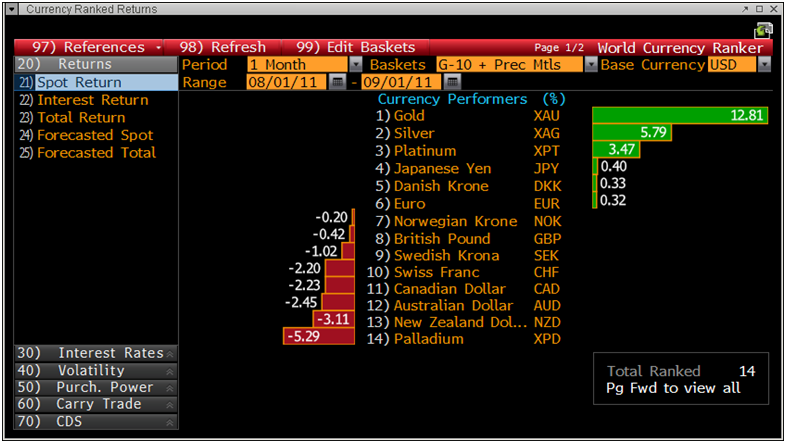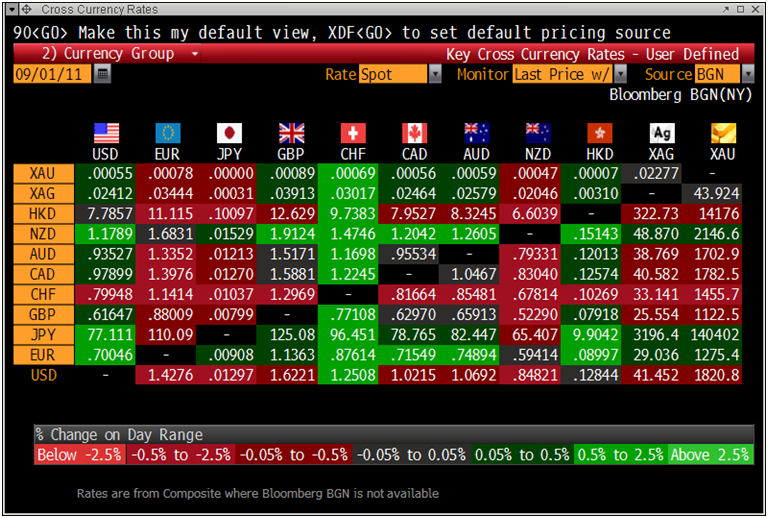 August was a very turbulent month for markets with equities falling sharply and commodities mixed on Eurozone and United States sovereign debt concerns and concerns about the health of the U.S. and global economy.
August was a very turbulent month for markets with equities falling sharply and commodities mixed on Eurozone and United States sovereign debt concerns and concerns about the health of the U.S. and global economy.For many markets, August's savage sell-off has been the worst since the October following Lehman Brothers’ implosion and investors diversified into havens such as high credit government bonds and gold.
Gold again proved its safe haven status recording strong gains in the face of turbulent markets globally.
From Goldcore:
August was a very turbulent month for markets with equities falling sharply and commodities mixed on Eurozone and United States sovereign debt concerns and concerns about the health of the U.S. and global economy.
For many markets, August's savage sell-off has been the worst since the October following Lehman Brothers’ implosion and investors diversified into havens such as high credit government bonds and gold.
Gold again proved its safe haven status recording strong gains in the face of turbulent markets globally.

G10 Currencies and Precious Metals in US Dollars in August
Precious Metals
Gold’s London AM fix this morning was USD 1,815.50, EUR 1,270.73, GBP 1,118.95 per ounce. The gold fix was lower than yesterday’s AM Fix in dollars and pounds but higher in euros - USD 1,826.00, EUR 1,264.19, GBP 1,121.14 per ounce.
Gold is trading at USD 1,819.50, EUR 1,274.10 , GBP 1,121.30, CHF 1,455.50 and JPY 140,320 per ounce.
Silver is trading at USD 41.46, EUR 29.04 , GBP 25.56, CHF 33.16 and JPY 3,196 per ounce.
For the month, gold rose 12.8% in US dollar terms. Gold rose 12.1%, 13.0%, 12.2% and 14.6% in euros, British pounds, Japanese yen and in Swiss franc respectively.
For the month, silver rose 5.5% in US dollar terms and by similar amounts in other currencies.

Precious Metals in US Dollars in August
Equities
The MSCI All-Country World Index of stocks fell 7% as did the FTSE All World Stock Index.
In the U.S., the Dow Jones Industrial Average dropped 4.4% in August, its fourth consecutive month of declines. For the month, the broader S&P 500 fell 5.7%, also its fourth straight monthly loss.
In Europe, the benchmark Stoxx 600 fell 11%. The FTSE fell 7.4% and the Dax plunged over 20% (the ISEQ fell 8.6%).
In Asia, the MSCI Asia Pacific Index fell 9.8% in August. The Nikkei 225 (NKY) fell 8.9 percent in August. There was a dramatic rise in the level of concern about the U.S. economy resulting in falls of 2.9% for the Australian index to 11.9% for the South Korean index.
The much smaller fall in the MSCI world index again showed the benefits of global diversification.
Commodities
Commodities saw a very mixed performance.
The Standard & Poor’s GSCI Total Return Index of commodities lost 1.8%.
Crude oil on the NYMEX fell 7.2% on US and global growth concerns. Copper fell 6.1% for similar reasons.
Economically sensitive nickel and zinc on the London Metal Exchange led the monthly declines on concern demand may weaken, declining 11% and 8% respectively.
Coffee was the biggest gainer in August, advancing 20%, the most since June 2010. Wheat advanced 11% as dry weather damaged the U.S. crop. Corn rallied 15% as the U.S. Department of Agriculture cut its estimate for the country’s crop, the worlds biggest.
Bonds
US Treasuries returned 2.8% while the global bond market gained 1.99% according to Bank of America Merrill Lynch index data.
German bunds also gained and the German bund yield fell more than 30 basis points over the month to yield 2.23%.
Periphery European nations bonds also saw gains after panic selling earlier in the month saw euro era record high interest rates.
Ireland’s 10-year yields declined 2.23% in August amid speculation that the nation may be able to grow its way out of its massive debt burden.
However, it is too early to tell whether the gains in the so called PIIGS debt markets are sustainable. The real risk is that the ECB intervention and bond buying programme may have merely bought more time and may ultimately lead to contagion in the Eurozone.
Currencies
The euro, the Danish krone, Japanese yen, Norwegian krone and the US dollar were the top performing G10 currencies in August (see ‘G10 Currencies and Precious Metals in US Dollars in August’ table above).
The worst performing currencies were the New Zealand dollar, Australian dollar, Canadian dollar and Swiss franc.

Cross Currency Table
All fiat currencies fell against gold and silver as global currency debasement continues.
For the latest news and commentary on financial markets and gold please follow us on Twitter.
SILVER
Silver is trading at $41.60/oz, €29.13/oz and £25.68/oz.
PLATINUM GROUP METALS
Platinum is trading at $1,842.50/oz, palladium at $770/oz and rhodium at $1,800/oz.
NEWS
(Wall Street Journal)
Gold Range-Bound In Asia As Risk Appetite Improves
(Bloomberg)
Silver Poised for ‘Golden Cross’ Advance to Record $50: GoldCore Technical Analysis
(MarketWatch)
Gold ends higher, gains 12% in August
(Reuters)
Gold steady after U.S. data; eyes on Fed
(CNBC)
Gold Rush Series Hits the Mother Lode: The GLD Vault
(Reuters)
Emerging central banks boost gold holdings in July
COMMENTARY
(Casey Research)
Behind the Scenes at GLD
(ZeroHedge)
Some Observations On Bob Pisani's Visit To GLD's Vault
(ZeroHedge)
The Ever Diminishing Returns Of Central Bank Intervention, Or QE As The Godfather Trilogy
(The Economic Collapse)
25 Signs That The Financial World Is About To Hit The Big Red Panic Button
(Barron’s)
Gold Gains 12% In August; Some Might Scoff, But Gartman Re-Enters Market
(MONEYWEB)
Roubini Interview: Gold Price Becoming a Bubble – Advises Owning US & German Cash and Bonds